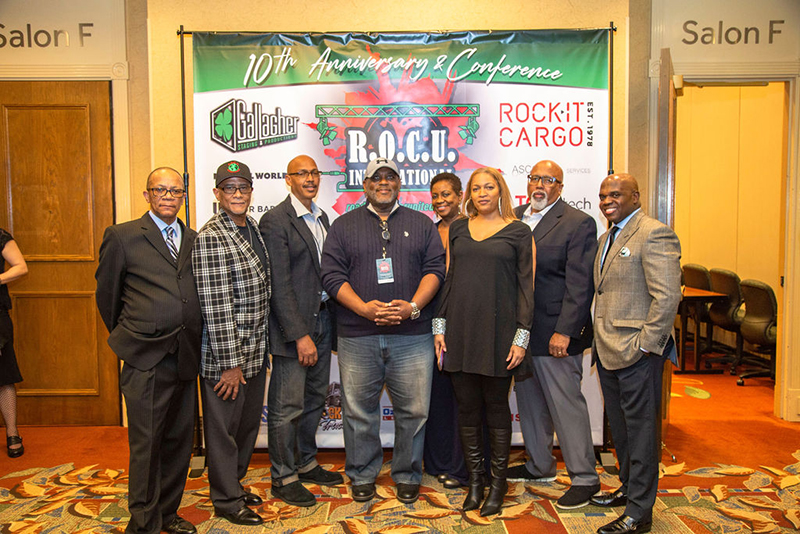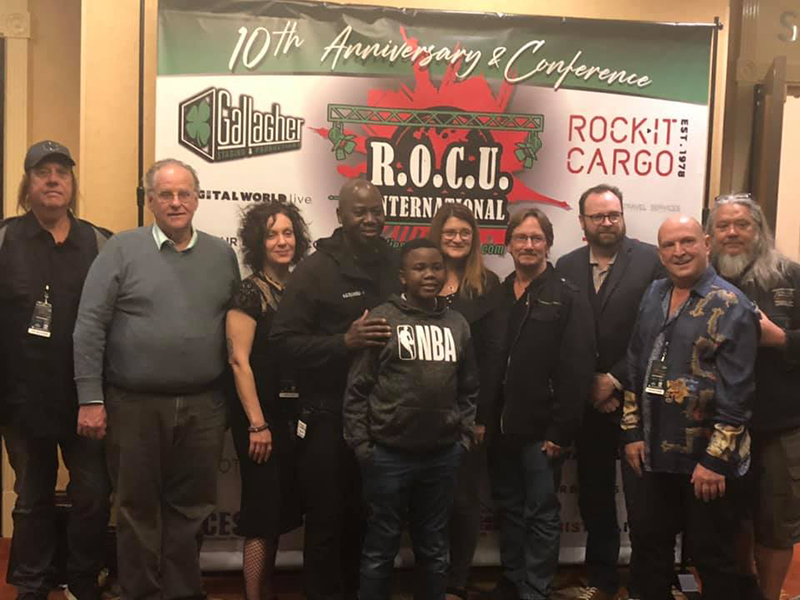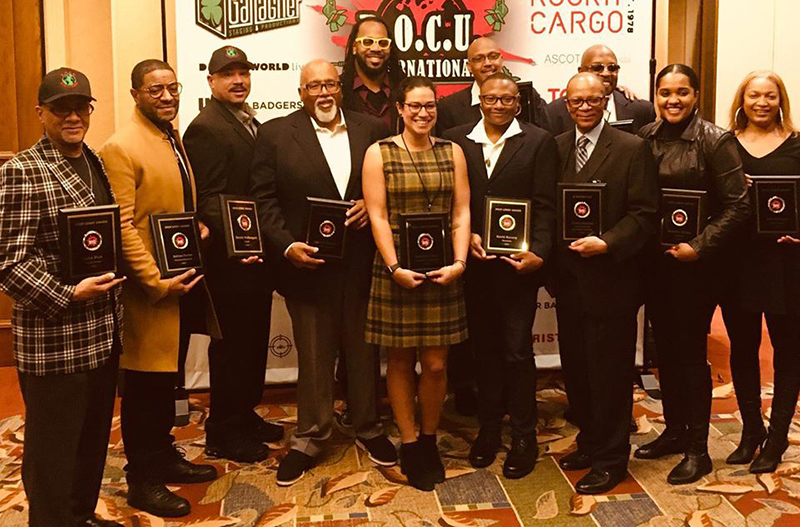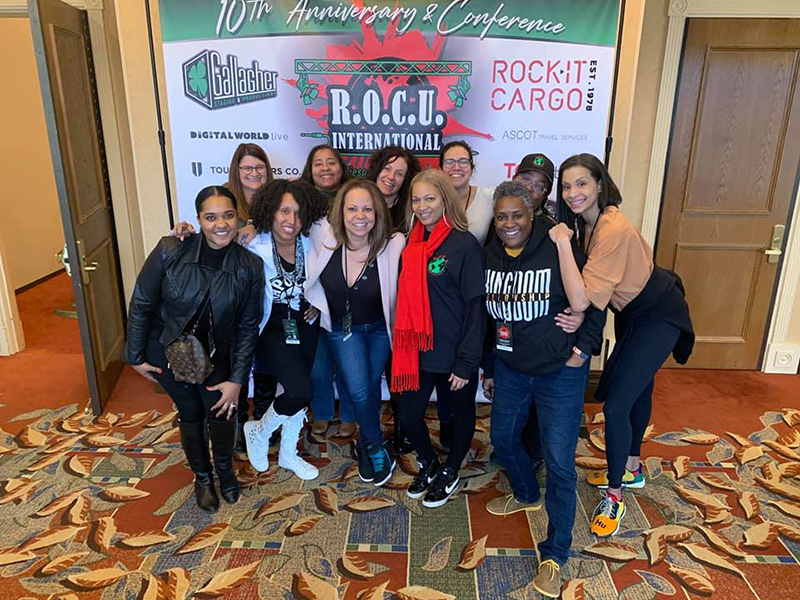
Roadies of Color United (R.O.C.U.), the social network created by Lance “K.C.” Jackson and Bill Reeves, celebrated their 10-year anniversary by putting on their first annual conference in Atlanta GA in February. With it came the inaugural Lenny Award Ceremony, named after the recently departed and irrepressible Lenny Guice, which celebrates outstanding work in the categories of the recipients. It has been a long journey from the original vision to finally making this event a reality.

Pronounced “Rock-U”
R.O.C.U. came about in 2009 as Jackson was venting his frustrations to Reeves about a lack of communication within their community and lack of representation of roadies of color in industry media. Both gentlemen are well known veterans of the live entertainment touring industry with 42 and 45 years respectively in the field. They have been at the heart of the growth of R&B and Hip-Hop acts that have come to represent a significant portion of revenue generated in the concert touring business.
“Why don’t we just start a site of our own, with the motto, ‘What side of the dollar bill do you look at when you spend them?’” suggested Reeves. And so the organization found its feet. Initially started as a standalone website in 2009 and administrated by Jackson, maintaining the site over six years became a financial challenge, so they migrated onto a Facebook Group page in 2015. Presently with 880 members, the organization and members of the FB page continue to grow, at least electronically.
During those years Jackson, Reeves and a small core of others had been discussing the idea of some type of roadie get-together; some kind of their own awards presentation. Formulization of such an event began at the funeral of Lenny Guice in 2015. Guice had started his career as the lighting director for the Commodores in 1978 and went on to become a world renowned carpenter as well as stage manager on some of the biggest tours on the road, including all of Madonna’s tours.
Jackson got permission from Lenny’s widow and son to name the award after him. In 2018, at the funeral of promoter rep Alan Thompson, Jackson stood with Jimmy Daniels, Sparkl West, and Shae Usher, who all agreed when he said, “We have got to quit meeting like this.” K.C. next called in top tour and production managers Bill Reeves, Tony Bulluck, David “5-1” Norman, and E. Kevin Jones. Together with K.C., Jimmy, Shae and Sparkl, they became the core team for developing the first R.O.C.U. conference and 10th anniversary celebration. Later additions to the team included Victor Reed Sr., Ronnie Stephenson, Lisa Pittman Dennis, Stuart Gray and Lonnie Ferguson, who rounded out the event planning committee.
Every Tuesday, from just after Thompson’s funeral all the way up to the week before the conference, no matter where in the world they were, the group met on a conference call. K.C. admits that he “threw out some wild ideas there, but Tony and Bill would reel me in when I started dreaming too large by gently telling me, ‘Whoa, one step at a time.’” Utilizing SurveyMonkey, they got feedback about where, when, and what people would want out of a conference. Inquiries and invitations were sent out to members and vendors alike regarding the forums and sponsorships needed to make the event a reality. A schedule was set for Feb. 7-8, 2020.
“I was really humbled by the response we got in support of this event,” says K.C. “Though many of our sponsors/vendors had already set their budget allocations in the fall of 2019, they all promised funds when the New Year rolled around. I am pleased to say that they all honored those commitments.”
The Conference Opens
The slightest amount of snow in Atlanta usually grinds the metropolis and all of its hubs of transportation to an immediate halt. While snow certainly looked charming on the beautiful grounds surrounding Evergreen Marriot in Stone Mountain Park, where the R.O.C.U. conference was held, it did not bode well for the many attendees flying in. Nevertheless, attendance was “all we hoped it would be,” says Jackson. “Contrary to my first inclinations, we didn’t have a massive response, but in the end, it has come to be even more than what we could ever hope for.”
Tour manager Bill Reeves, currently with singer/songwriter Anthony Hamilton, says “Our whole purpose for the conference is to get the people we work with and see all the time, only fleetingly; together all at once in one place that is not a gig. R.O.C.U. is meant to be a collaborative platform and a network for the exchange of ideas, information, and most importantly foster a sense of community. You cannot do that without personal interaction.”
That, he admits, is not necessarily a unique idea. It is something that happens at all conferences along with just acknowledging each other’s presence. “A lot of guys here have not had that experience. This is what we do; it’s not like I started just last week or do this on the weekends and go back to my “regular” job on Monday,” he says. “We have people just as seasoned as K.C. and I; with over 20 years.”
Reeves acknowledges the challenge created by the misperception that people of color can do R&B, but not rock or country tours. “The real fact is, if you have a certain amount of talent and depth of experience, that you can apply anywhere. It doesn’t matter who you are shining that light on or mixing. I haven’t spent the last 45 years successfully in this business, because I don’t know what the “f*** I’m doing. I think I probably had a clue. Either that.” he says, laughing, “or I have an amazing line of BS!”
Pretty much all the Who’s Who of R&B were represented. “That is a powerful statement for me,” smiles Jackson, “the fact they were willing to come. When Allen Floyd walked in the door I was floored. I knew Allen when he was the photographer for Destiny’s Child, and now he is the tour director for Beyoncé. I love how this conference has let me see the growth and success in people.”
Eddie Kercher, PM for Incubus, attended the conference with Joe Gallagher, whose company, Gallagher Staging and Productions, was a major sponsor for the conference. “It was a really good time running into people I toured with way back when and have not seen in 30 plus years, as well as talking to the younger people in the business just starting out.”
Steve Maples from Rock-it Cargo wholeheartedly agrees. “I am absolutely honored. I have some dear friends involved in this organization that I have worked with some 30, 40 years. It was a real easy decision to make. We also support women in the rock ‘n’ roll business; I think they are underrepresented and glad they have a voice of their own at SoundGirls.org. Hopefully what this will lead to is a voice for anybody who is an outlier in the rock ‘n’ roll industry. We’ll be here next year and continue to support it.”
Adds Kercher, “The Roundtable Discussion on Production and Stage Managers where Bill Reeves was one of the moderators was one of the best forums I have ever sat in. I respect Bill very much. Besides all his knowledge, he is one of the nicest people I have ever met. I’ll be back.”

Real Information and Socialization
The structure of the conference came in roundtable discussions and forums led by industry professionals. All focused upon exchanging information and building a sense of professionalism, followed in the evening with the banquet and awards dinner. Individual sessions were staggered in such a timely way as to provide time for one to attend with ease. Lighting, Media Servers, Audio, and Tour Logistics started the day. The Mentorship forum was clearly one of the cornerstones to the conference.
Joining K.C. and Reeves at the mentorship moderators table were Victor Reed, CEO of Global Events Productions, and Curtis Vannoy, industry veteran of 50 years and Carpenter for Reba, Swing tech for both Brooks & Dunn and Rascal Flatts to name a few. He started out in the business working for NASCAR. Their backgrounds and experience were the key for many of the questions posed at the conference.
“This business is a relationship business,” Jackson tells the audience. “To some extent, competitiveness is a bit of a detriment. Some guys did not want to share their experience for fear of losing a gig. We have to change our mindset about that. So the conference is a launch pad for sharing that experience.”
“As we deepen our relationships with people and vendors that’s how we all get gigs and do them successfully,” added Reeves. “This is basically a handshake business. Sure, there are contracts and invoices, but at the end of the day its one guy calling another.”
The idea behind the roundtables is that a bunch of techs get together and talk about tech stuff. One guy has a problem with a particular console or piece of gear. Another guy in the group has the answer and can offer the solution because he ran into this exact issue somewhere else. Thus the exchange begins.
The afternoon agenda centered around Venue Safety, The Business of Music, Insurance and a presentation on Independent Contractor vs. Employee. “Sure, it’s a calling, it’s fun and all and it’s not for everybody, but after all is said and done, it is a business.” noted Reeves.
“One of the downsides of R&B vs. rock ‘n’ roll is, we spend more time competing against each other than collaborating.” noted K.C. in The Music roundtable. “It’s why there are no major minority-owned lighting or sound companies. We’re self-defeating. We are going to change that, and it starts here at R.O.C.U.”

The Lenny Awards Presentation
After a superb dinner, Stuart Gray led a memorial presentation celebrating the lives of those no longer with us. He began the honorarium acknowledging “Uncle” Joe Schaffner’s presence at the banquet, who was attending despite health problems. Now 79 years old, he started in the 1950’s and at least two generations of roadies in the room could trace their start in the business back to him. In introducing the Lenny Awards, Gray spoke about his personal connection and depth of gratitude for Lenny Guice. His godfather, who managed the Commodores, took him one summer to Tuskegee, AL and introduced Stuart to Guice with the simple introduction of, “This is my boy, show him what to do and take care of him.” Lenny, at that time was the lighting director for the Commodores. Award winners can be found on the Roadies of Color United website, roadiesofcolorunited.com.

Future Visions
“We want to continue to evolve as a community,” says Reeves. “This is not a racial thing, not a demographics thing. It’s a community of touring professionals who deepen their knowledge and their experience and qualifications. We want to foster that exchange of information for technicians, engineers and managers.” With its commitment to supporting diversity, Roadies of Color United accepts people of any color as members.
“At some point we think we want to get to where we could be a resource for staffing tours,” Reeves continues. “Not, by any means a labor company; there are plenty of good ones already out there. We want to be a place where people look for recommendations of people. What we would do is send out several candidates. It would not be in our purview to find work for guys but more a resource. Do you know of any good… whatever? Our answer is sure; here are some names and resumes.”
Another goal is to become a little more formalized and offer services to people on the road who may need insurance or get their money managed because they have no one at home to do it. Toward that goal, Jackson is working on giving the group a 501 C (6) classification, which would allow the non-profit organization to advocate and provide the aforementioned services.
Jackson shared his desire to give something back to the industry that he loves so much by sharing his knowledge, wisdom and experience with others especially the next generation. “Ultimately, my hope and desire is to help pave the way for a more diverse and inclusive industry.”


